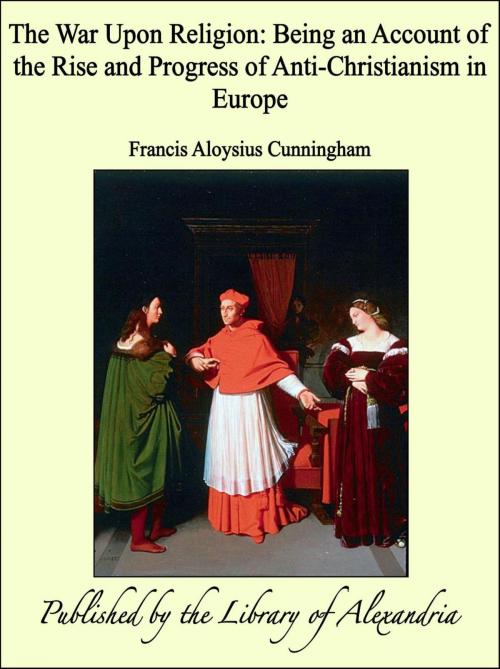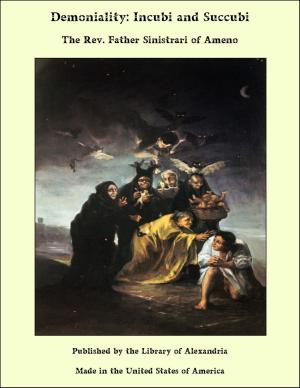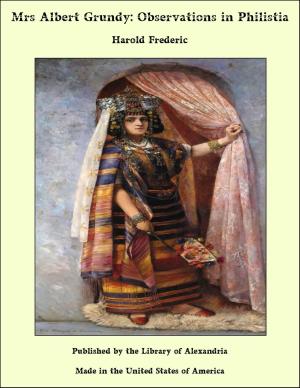The War Upon Religion: Being an Account of the Rise and Progress of Anti-Christianism in Europe
Nonfiction, Religion & Spirituality, New Age, History, Fiction & Literature| Author: | Francis Aloysius Cunningham | ISBN: | 9781465562463 |
| Publisher: | Library of Alexandria | Publication: | July 29, 2009 |
| Imprint: | Library of Alexandria | Language: | English |
| Author: | Francis Aloysius Cunningham |
| ISBN: | 9781465562463 |
| Publisher: | Library of Alexandria |
| Publication: | July 29, 2009 |
| Imprint: | Library of Alexandria |
| Language: | English |
If it is true that a nation is what its doctrines are, it becomes very easy to discover in the doctrines of contemporary Europe the last reason of the troubles and revolutions which keep it in constant turmoil. It has sowed the wind, now it is reaping the whirlwind. It has destroyed the foundations, and it is but natural that the edifice should begin to fall to its ruin. The English Socinians, followed by Voltaire, uprooted the Christian idea, and Rousseau after denying the true nature of God, set up the worship of man in His place. From these ancestors was born a generation of rationalists and atheists, who celebrated their triumphs, first in the French Revolution, and afterwards in the general dissolution of organized society. Out of the jumble of confused systems arose all those philosophic, religious, moral, and social aberrations which strive to root themselves in the human mind of the twentieth century. Among the Catholics themselves, whenever ambition or the malign influence of worldly allurements were in the ascendant, there were here and there excrescences of error which tended to diminish the vigor and integrity of the Christian spirit, and lead to that mongrel condition characterized under the name of "Liberal Catholicism." Rationalism, properly speaking, began in Germany, a country which, until lately, has effected little in the domain of thought, and in the fields of faith and reason, except to ravage and destroy the creations of centuries. Unhappily, however, it has built up nothing in their place. Emmanuel Kant, born in Prussia in 1724, began the process of demolition. Materialistic philosophy had already denied the existence of the soul, and of the invisible world; Kant proceeded to the denial of any certitude regarding the material and visible. With him everything assumed the character of the mythical and ideal. To explain his process he invented in man a second reason, the practical reason, which reconstructs what the speculative reason destroys. In fact, by separating the faculties of the human soul from the objects which they perceive, he led the way to systematic scepticism. Kant was followed by Fichte. As the former instituted a doubt as to the reality of external objects, Fichte declared that there was no external reality, that the universe surrounding us is only a fiction of the mind to which we alone give reality, and the world is only a form of our own activity. Kant and Fichte assailed the reality of things outside the "Ego," the personal mind; it remained for Schelling—born in 1775—to destroy both subject and object, and to confound all things mind and matter in one immutable, eternal existence. With Hegel, a disciple of Schelling everything becomes pure obscurity, absolute confusion, chaos. Hegelianism was, in principle, the identity of contradictories, the identity of truth and error, of good and evil. In him was verified the prophesy of Isaias of those "who call evil good, and good evil; who put darkness for light, and light for darkness; who put bitter for sweet, and sweet for bitter." It was a system that insinuated that nothing really exists, that existence is merely a happening; that truth is not truth in itself, that there is no definite truth. It was the affirmation and negation of one and the same thing, fact, or being, at one and the same time. It was important inasmuch as it led the way to systems even more bizarre and destructive in the intellectual and moral order
If it is true that a nation is what its doctrines are, it becomes very easy to discover in the doctrines of contemporary Europe the last reason of the troubles and revolutions which keep it in constant turmoil. It has sowed the wind, now it is reaping the whirlwind. It has destroyed the foundations, and it is but natural that the edifice should begin to fall to its ruin. The English Socinians, followed by Voltaire, uprooted the Christian idea, and Rousseau after denying the true nature of God, set up the worship of man in His place. From these ancestors was born a generation of rationalists and atheists, who celebrated their triumphs, first in the French Revolution, and afterwards in the general dissolution of organized society. Out of the jumble of confused systems arose all those philosophic, religious, moral, and social aberrations which strive to root themselves in the human mind of the twentieth century. Among the Catholics themselves, whenever ambition or the malign influence of worldly allurements were in the ascendant, there were here and there excrescences of error which tended to diminish the vigor and integrity of the Christian spirit, and lead to that mongrel condition characterized under the name of "Liberal Catholicism." Rationalism, properly speaking, began in Germany, a country which, until lately, has effected little in the domain of thought, and in the fields of faith and reason, except to ravage and destroy the creations of centuries. Unhappily, however, it has built up nothing in their place. Emmanuel Kant, born in Prussia in 1724, began the process of demolition. Materialistic philosophy had already denied the existence of the soul, and of the invisible world; Kant proceeded to the denial of any certitude regarding the material and visible. With him everything assumed the character of the mythical and ideal. To explain his process he invented in man a second reason, the practical reason, which reconstructs what the speculative reason destroys. In fact, by separating the faculties of the human soul from the objects which they perceive, he led the way to systematic scepticism. Kant was followed by Fichte. As the former instituted a doubt as to the reality of external objects, Fichte declared that there was no external reality, that the universe surrounding us is only a fiction of the mind to which we alone give reality, and the world is only a form of our own activity. Kant and Fichte assailed the reality of things outside the "Ego," the personal mind; it remained for Schelling—born in 1775—to destroy both subject and object, and to confound all things mind and matter in one immutable, eternal existence. With Hegel, a disciple of Schelling everything becomes pure obscurity, absolute confusion, chaos. Hegelianism was, in principle, the identity of contradictories, the identity of truth and error, of good and evil. In him was verified the prophesy of Isaias of those "who call evil good, and good evil; who put darkness for light, and light for darkness; who put bitter for sweet, and sweet for bitter." It was a system that insinuated that nothing really exists, that existence is merely a happening; that truth is not truth in itself, that there is no definite truth. It was the affirmation and negation of one and the same thing, fact, or being, at one and the same time. It was important inasmuch as it led the way to systems even more bizarre and destructive in the intellectual and moral order







![Cover of the book The Soil [La terre] by Francis Aloysius Cunningham](https://www.kuoky.com/images/2015/march/300x300/9781465618849-QOtb_300x.jpg)







